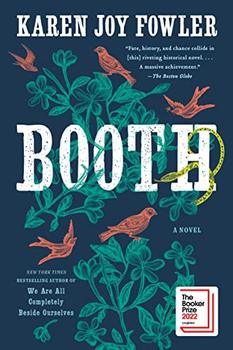Page 1 of 1
There is 1 reader review for Booth
Write your own review!
 Cathryn Conroy
Original, Imaginative and Ingeniously Plotted: A Riveting Story That Is Also a Warning for Our Times
Cathryn Conroy
Original, Imaginative and Ingeniously Plotted: A Riveting Story That Is Also a Warning for Our Times
A warning. That is what this book is. A chilling, daunting and, perhaps, prophetic warning. And you don't even have to be a particularly astute reader to see that.
This is the personal life story of one of the most despised and reviled assassins in American history, but instead of being told from the point of view of John Wilkes Booth, it is told from the perspective of three of his siblings. This is a brilliant and compelling historical novel that is firmly grounded in prodigious research and sweetened with an imagined rendering of the Booth family daily lives, thoughts, and conversations.
Written by Karen Joy Fowler and longlisted (as of this writing) for the prestigious 2022 Booker Prize, this is the story of one American family that mirrors the divisions and hatreds that consumed our nation in the mid-1800s. Junius Brutus Booth is a highly revered and hugely popular Shakespearean actor. Even without the benefit of mass media, he is a celebrity. Junius is harboring a big, dark secret, so he moves his wife, Mary Ann, and their children—eventually there are 10 children, although four die in childhood—to what he considers a secret farm in Bel Air, Maryland. Junius is away touring with his theater troupe nine months of the year, leaving the family on their own and often without money. The ninth child in this brood and the obvious favorite of everyone is John Wilkes. He is charming, brave, and daring.
This novel is told through the eyes of three of John's siblings: sisters Rosalie and Asia and brother Edwin. The siblings are so different from each other! Rosalie is a slightly physically deformed spinster, growing more bitter by the years. Asia is beautiful but can be coldhearted and even cruel. At one point in the book, she is described as "all ice and iron." Edwin is the only one in the family who makes money, but he is a raging alcoholic. The family eventually move to Baltimore, and when Junius's deep, dark secret is revealed, it causes a scandal for the entire family. The children grow up, and Edwin and John become actors. Edwin rises to fame and a bit of fortune; John is mediocre. But John has passionate feelings about the South's position in the Civil War and Abraham Lincoln—feelings that horrify his family. These feelings eventually consume him until he assassinates the president during a stage performance at Ford's Theater on April 14, 1865.
Interspersed throughout the book are snippets about Lincoln—what he is doing at the same point in time, as well as brief excerpts from his speeches and letters. It's a subtle and tragic reminder of what's to come.
Even though we all know how this story ends, the novel is still a captivating read. I wouldn't go so far as to call it a page-turner—sometimes Fowler gets bogged down in the historical minutiae—but it is original, imaginative, and ingeniously plotted. Because we know John Wilkes Booth only through his siblings' eyes, we see him as a real human being. His sisters and brothers loved and adored him so it's hard for readers not to do the same—except when we remember his evil, murderous deed.
But this is more than history transformed into story. It is also an unnerving and prescient allegory for today's divisive politics that spark hatred, fear, and dissension both within our own families and our communities. And that hatred, fear, and dissension are what lead to tragedies.
This is not only a good book, but also it's a warning.
